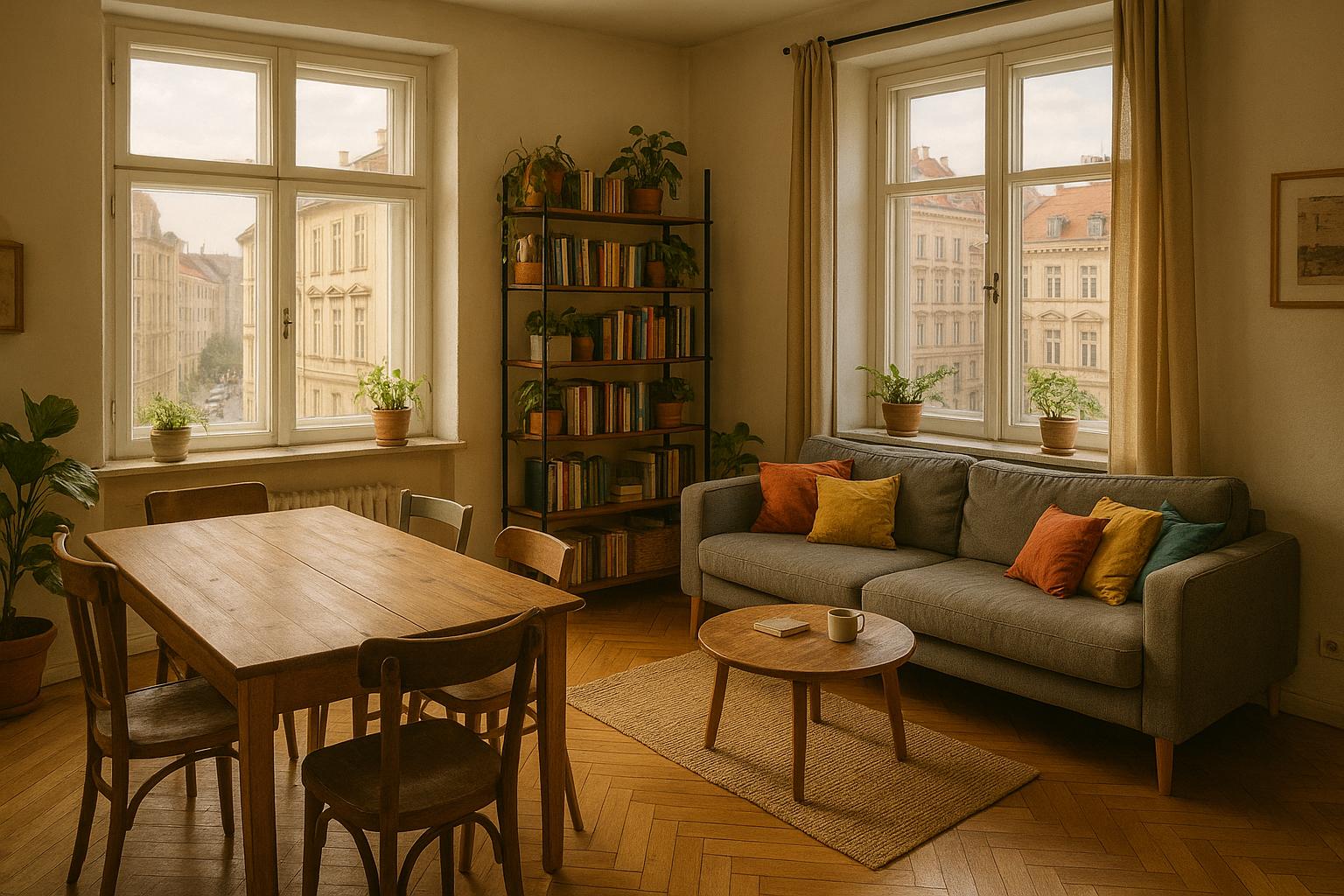Shared housing in European capitals is becoming a key solution to rising living costs. Here's what you need to know:
- Amsterdam: Europe's most expensive city for rentals in 2025. Shared rooms average $1,048/month, with mid-range options around $600–$750.
- Berlin: Affordable shared living with rents averaging $738/month, taking up about 23% of disposable income.
- Paris: High costs with shared housing reducing expenses by 30%, averaging $1,067/month for a studio.
- Madrid: Budget-friendly with shared rooms costing $535–$630/month and all-inclusive coliving starting at $675/month.
- Prague: Affordable shared rooms range from $590–$920/month, with bundled services making budgeting easier.
- Budapest: The most economical option, with shared rooms costing $470–$750/month, but still a high percentage of local incomes.
Quick Comparison
| City | Average Shared Rent (USD) | % of Disposable Income | Key Features |
|---|---|---|---|
| Amsterdam | $1,048 | 37% | High costs, compact spaces, essential amenities |
| Berlin | $738 | 23% | Affordable, utilities often included, WG culture |
| Paris | $1,067 | 36% | Expensive, all-inclusive packages, CAF aid |
| Madrid | $535–$630 | ~30% | Budget-friendly, vibrant neighborhoods |
| Prague | $590–$920 | 30–40% | Low costs, bundled services, high demand |
| Budapest | $470–$750 | ~62% | Cheapest option, but high % of income |
Shared housing offers cost savings and community benefits but comes with compromises in privacy and space. Platforms like Coliving.com simplify finding all-inclusive, flexible options across European capitals.
1. Amsterdam
Amsterdam holds the title as Europe's priciest city for apartment rentals, with housing costs consuming a large chunk of residents' earnings. This has made shared housing not just common but often essential for managing expenses.
Average Monthly Rent (USD)
The cost of shared housing in Amsterdam varies widely depending on the neighborhood and room size. According to the Kamernet Rent Report Q1 2025, the average monthly rent for a room hit $1,048 (~€979), showing a 3.2% increase from the previous quarter’s €949.
Room rents range from $514 in less central areas to over $2,140 in high-demand neighborhoods. By comparison, a typical furnished one-bedroom apartment costs around $2,675 per month. Mid-range options for shared housing generally fall between $600 and $750, with rooms in Geldershoofd and Robert Fruinlaan averaging $696 (~€650) per month.
Inclusions (Utilities, Wi‑Fi, Cleaning)
Most shared housing setups in Amsterdam include basic utilities like water, trash removal, heating, and hot water in the rent. However, tenants are often responsible for arranging their own internet, unless staying in coliving spaces, which frequently include Wi‑Fi in their packages.
Coliving spaces go a step further by offering extras like cleaning services, furniture, and communal areas, helping tenants avoid surprise expenses. Platforms such as Coliving.com provide fully furnished spaces across Amsterdam neighborhoods with utilities, Wi‑Fi, and cleaning services bundled into the rent.
Be aware, though, that some landlords impose caps on utility usage. If you exceed these limits, you might face additional charges. Always check your lease to understand what's included.
Room/Bedroom Size
Rooms in Amsterdam's shared housing market can be as small as 97 square feet (9 m²), reflecting the city's high demand and limited space. These compact rooms require creative solutions for storage and personal comfort.
Larger rooms or those in more desirable areas naturally come with higher price tags. Room size plays a big role in determining monthly costs, which explains the wide range in rental prices across the city.
Percentage of Median Disposable Income Spent
Housing costs in Amsterdam take a significant bite out of residents' earnings. With the Netherlands' household disposable income per capita projected to be around $34,280 in 2025, the average room rent of $1,048 per month accounts for roughly 37% of disposable income.
When factoring in the median gross salary in the Netherlands - approximately €46,500 annually before taxes and deductions - the portion of income available for housing shrinks even further. This financial strain highlights why shared housing has become more than just a trend; for many, it’s a necessity.
These dynamics mirror similar challenges faced in other major European capitals.
2. Berlin
Berlin offers a stark contrast to Amsterdam, especially when it comes to housing costs. The city’s well-known Wohngemeinschaft (WG) culture - shared living arrangements - has become a popular choice for students, young professionals, and anyone looking to stretch their budget further.
Average Monthly Rent (USD)
Shared housing in Berlin is notably easier on the wallet compared to other major European cities. Prices vary based on location and room type, ranging from $428 for shared bedrooms to $862 for private rooms. On average, you can expect to pay about $738 (~€690) per month for a private room in a shared apartment.
Berlin’s affordability becomes even clearer when compared to cities like Paris, where housing costs can be nearly double. Between 2018 and 2024, rents in Berlin increased by just 7%, reflecting a relatively steady growth rate. This affordability, paired with the city’s WG culture, makes it a top choice for students and professionals alike.
Inclusions (Utilities, Wi‑Fi, Cleaning)
Most shared housing arrangements in Berlin come with bundled utilities, making it easier to manage monthly expenses. These typically include electricity, gas, water, and internet/Wi‑Fi. Be sure to check your contract for "Nebenkosten", which may cover additional expenses.
In traditional shared apartments, tenants often split the broadcasting fee (GEZ) among roommates. These bundled services add to the convenience and appeal of shared living in Berlin.
Percentage of Median Disposable Income Spent
Berlin’s housing costs remain manageable when compared to average incomes. In 2021, German households spent an average of 23.3% of their net disposable income on housing, with single-person households spending up to 31.8%.
For Berlin residents, the average after-tax salary is around $3,210 (€3,000). With shared housing costs averaging $738 per month, this means about 23% of income is spent on accommodation. This balance between income and expenses makes Berlin especially attractive to international students, remote workers, and young professionals who want affordable living without sacrificing quality.
Platforms like Coliving.com make shared living even more accessible by offering fully furnished, all-inclusive spaces starting at just $100 per month. These cost-effective solutions further cement Berlin’s reputation as a budget-friendly hub for shared housing in Europe.
3. Paris
Paris, much like Amsterdam and Berlin, is known for its high living costs, but shared housing offers a more affordable way to experience life in the French capital. By choosing shared accommodations, residents can save up to 30% compared to renting solo. For students, young professionals, and remote workers, this can make the City of Light a more budget-friendly option despite its reputation as one of Europe's priciest cities.
Average Monthly Rent (USD)
Renting in Paris doesn't come cheap. A furnished studio typically starts at $1,067 per month, while a one-bedroom apartment averages around $1,484. Opting to share these spaces can reduce costs significantly - by about 30%. This makes shared housing an appealing choice for those looking to cut down on expenses while still enjoying city life.
Inclusions (Utilities, Wi‑Fi, Cleaning)
Shared housing providers in Paris often simplify life by bundling multiple services into their rent packages. For instance, as of January 2023, Cohabs included essentials like salt, pepper, dishwashing liquid, weekly cleaning of shared spaces, Wi‑Fi, Netflix, and utilities (water, gas, and electricity). These all-in-one solutions often come with digital tools for managing services, making everyday living easier.
Similarly, La Casa offers packages that include cleaning, Wi‑Fi, maintenance, roommate matching, and even monthly events. These arrangements remove the hassle of splitting bills or coordinating services with roommates. Before signing a lease, it’s always a good idea to double-check what’s included in the rent. Additionally, many shared housing options may qualify for housing aid from CAF (Caisse d'Allocations Familiales), which can further ease financial pressures.
Percentage of Median Disposable Income Spent
Living in Paris comes with a hefty price tag, as housing typically consumes over 36% of disposable income - well above the European average. For those looking for more budget-conscious solutions, platforms like Coliving.com offer fully furnished, all-inclusive spaces. These options not only help balance the financial load but also provide access to Paris's rich culture and countless opportunities.
4. Madrid
Madrid is one of Europe's more budget-friendly capitals when it comes to shared housing. The city appeals to young professionals, students, and remote workers, offering a mix of affordable living, vibrant culture, and excellent amenities. Compared to pricier cities like Paris or Amsterdam, Madrid provides a more economical option without sacrificing quality of life. Its shared housing market also emphasizes affordability and a strong sense of community, similar to cities like Berlin and Amsterdam.
Average Monthly Rent (USD)
Shared housing in Madrid delivers excellent value for money. Private rooms typically cost between $535 and $630 per month, with the average hovering around $535 as of June 2025. Renting an entire space, however, is significantly pricier - studios start at around $855 per month, while one-bedroom apartments in the city center average about $1,465.
For those seeking all-inclusive coliving arrangements, platforms like Coliving.com offer options starting at $675 per month, with premium packages reaching up to $1,225. In popular neighborhoods such as Salamanca, Malasaña, Chueca, and Chamberí, premium rooms can go for as much as $1,060. Compared to other major cities like Berlin or London, Madrid's shared housing remains a more economical choice.
Inclusions (Utilities, Wi-Fi, Cleaning)
Many shared housing providers in Madrid, including Cohabs, offer bundled services that simplify living expenses. These packages typically include utilities (gas, electricity, water), internet (valued at $34), and weekly cleaning services (worth $43), along with essential household supplies. Altogether, these amenities save renters an estimated $165 per month.
"Hassle-free amenities: Fully-furnished home with WiFi, Netflix, and all utilities (water, gas, electricity, etc.)." - Cohabs
Additional perks often include home insurance, maintenance services, and access to community events, making shared housing an even more attractive option. Flexible lease terms are another bonus, catering to the needs of students and professionals alike.
Percentage of Median Disposable Income Spent
Like other European cities, Madrid's rental market reflects broader economic challenges for young adults. Nearly half of Madrid residents aged 18-35 still live with their parents, largely due to rising housing costs and a competitive rental market. For those who move out, shared housing offers a cost-effective alternative. Students typically spend between $375 and $750 per month on shared accommodations, while young professionals in sought-after neighborhoods pay at least $535, with premium options climbing to around $1,070.
With an average rental price of $17.30 per square meter, shared housing provides access to desirable neighborhoods and amenities that might otherwise be out of reach. This balance of affordability and Madrid's lively atmosphere continues to attract international residents looking for a European lifestyle without the steep costs of northern capitals.
5. Prague
Prague is one of Europe's more budget-friendly capitals when it comes to shared housing, making it a popular choice for students and young professionals. It strikes a great balance between cost and quality, offering lower rental prices compared to cities like Amsterdam. The city's housing trends reflect broader regional shifts, keeping it an attractive option for renters.
Average Monthly Rent (USD)
As of early 2025, renting a furnished private room in Prague costs around $691 per month on average. If you're looking for a one-bedroom furnished apartment, expect to pay about $1,250 monthly - roughly half of what you'd spend in Amsterdam. While rental prices have risen by about 30% between 2020 and 2025, including a 10% jump in 2024 alone, Prague still offers affordable options. For January 2025, the average rental price hit CZK 412 per square meter (about $17.30). Shared apartment rooms typically range from $590 to $920 per month.
Location plays a big role in pricing. Apartments listed for under CZK 20,000 per month (around $840) are in high demand and often rent out within days, especially in central areas.
Inclusions (Utilities, Wi‑Fi, Cleaning)
Many shared housing options in Prague come with bundled services, making it easier to manage expenses. Most rentals include utilities like electricity, gas, water, and Wi‑Fi in the monthly rent. For students, triple dormitory rooms cost about $320 per person, while single rooms average $600. These prices often cover VAT, tourist tax, cleaning, bed linen, Wi‑Fi, reception services, and utilities.
For example, in May 2025, we listed a room in a shared 5-bedroom apartment for about $820 per month, with all basic utilities included. While some places may charge extra for laundry or a one-time cleaning fee, most rentals keep essential services built into the base rent. These all-inclusive packages make it easier to understand the overall value of renting in Prague.
Rental Affordability Overview
Prague's affordability becomes even more evident when factoring in local incomes and living costs. The city mainly attracts younger renters, with many aged 18–24, including students and early-career professionals.
Even with a 30% rise in prices over five years, Prague remains competitive, offering rooms starting at $590 per month. Bundled services ensure housing remains manageable. Current room availability is at 10.1% for the coming months, with July expected to have the most options over the next six months.
Platforms like Coliving.com further add to Prague's appeal by offering fully furnished spaces with utilities, Wi‑Fi, and cleaning services starting at $100 per month. This combination of affordability and convenience cements Prague's reputation as a top destination in Europe's shared housing market.
6. Budapest
Budapest is a standout choice for budget-conscious renters looking for shared housing in a European capital. Known for being one of the most affordable major cities in Europe, it offers significant savings compared to cities like Amsterdam, Berlin, and Paris. Despite its lower costs, Budapest still provides quality housing options alongside essential services, making it a practical option for those seeking a balance between affordability and comfort.
Average Monthly Rent (USD)
As of early 2025, renting a furnished one-bedroom apartment in Budapest costs about $840 (800 euros) on average. This is around 33% cheaper than Prague, where similar apartments average $1,250. Shared housing options in Budapest are even more economical, with rooms typically priced between $470 and $750 per month, according to Spotahome listings, which report prices ranging from 112,000 Ft to 180,000 Ft.
For those considering a one-bedroom apartment in the city center, the average rent is approximately $1,060 (253,473 Ft). Meanwhile, apartments located outside the center average around $805 (192,200 Ft). On a global scale, Budapest’s rental costs are remarkably low - about 82.5% cheaper than New York. The overall cost of living (excluding rent) is also significantly lower, at roughly 55.5% less than in New York.
Inclusions (Utilities, Wi-Fi, Cleaning)
Many rental agreements in Budapest include utilities such as electricity, gas, water, and Wi-Fi, though some may charge extra. When utilities aren't bundled, renters can expect to pay an additional $47 to $68 (45–65 EUR) per room each month.
For instance, Suzanne Apartments offers single rooms in shared housing with fixed utility costs for students. During semesters, the extra charge is $105 (100 EUR) per month, covering utilities, common costs, internet, and two cleaning services. In the summer, this fee drops to $53 (50 EUR) and includes one cleaning service. Spotahome listings frequently highlight rentals where utilities and periodic cleaning are included, ensuring clear and predictable monthly expenses. Such arrangements simplify budgeting and make it easier to align housing costs with income levels.
Percentage of Median Disposable Income Spent
While Budapest offers low rental prices, they can still take up a significant portion of local incomes. With Hungary’s median monthly disposable income at around $960, spending $600 on rent amounts to 62% of income - a high percentage, particularly for students and young professionals. Many rely on additional income streams or family support to manage these expenses.
That said, Budapest remains relatively well-off compared to the rest of Hungary. In 2023, per capita consumption in Hungary was 70% of the EU average, and poverty risk rates in Budapest were reported at under 10%. These factors reflect the city’s stronger economic conditions compared to other regions in the country.
Budapest’s affordable rents, combined with all-inclusive housing packages, make it an attractive option for anyone looking to live in a European capital without the steep costs of Western Europe. Platforms like Coliving.com add to the appeal by offering fully furnished spaces with utilities, Wi-Fi, and cleaning services starting as low as $100 per month, making shared housing in Budapest even more accessible.
Benefits and Drawbacks
Shared housing in European capitals strikes a balance between affordability and inevitable compromises. While it offers clear financial and social benefits, it also comes with challenges that vary depending on the city. Understanding these trade-offs is key to making informed decisions about where to live and what to expect.
The biggest advantages revolve around saving money and building connections. Shared housing can make some of Europe’s most expensive cities more accessible for young professionals, students, and remote workers. Services like utilities, internet, and cleaning are often bundled into one payment, simplifying monthly expenses. The convenience factor is hard to ignore - fully furnished spaces mean you can move in with just a suitcase, and flexible lease terms make it easier to adapt to life changes. On top of that, community events and shared spaces provide a great way to meet people and feel less isolated, especially for newcomers.
"Sharing with others helps you find meaning, belonging and acceptance in life." - Coliving.com
But shared living isn’t without its downsides. Privacy is a common concern when you’re sharing kitchens, bathrooms, and other common areas. This setup can disrupt personal routines and lead to conflicts over cleanliness, noise, or differing lifestyles. Smaller rooms can also limit how much of your personal furniture or belongings you can bring, and shared storage or kitchen spaces might even lead to higher food costs if access is restricted.
Interestingly, studies show that only 21% of people prefer shared housing, with privacy and personal freedom being the most common reasons for hesitation.
| City | Primary Benefits | Main Drawbacks |
|---|---|---|
| Amsterdam | Central locations, strong community, high-quality amenities | Extremely high costs even when shared, limited availability |
| Berlin | Vibrant cultural scene, reasonable prices, flexible arrangements | Language barriers, bureaucratic processes, gentrification pressure |
| Paris | Prestigious locations, excellent public transport, cultural immersion | High costs, small living spaces, strict rental regulations |
| Madrid | Affordable compared to other capitals, warm climate, social culture | Limited English-speaking communities, economic uncertainty |
| Prague | Great value for money, historic charm, growing expat community | Language challenges, fewer international companies |
| Budapest | One of the most budget-friendly options, good quality-to-price ratio | Limited housing options, broader economic constraints |
The shared housing experience is shaped by these city-specific factors, but other challenges can complicate things further. Financial inequality and social isolation are common issues, especially for migrants who may face discrimination or cultural barriers. In some co-living setups, residents can become disconnected from the local community, limiting their ability to integrate into the surrounding culture. On top of that, uncertainty about long-term housing options can add to the stress.
Platforms like Coliving.com aim to tackle some of these issues by offering standardized quality, clear pricing starting at $100 per month, and professional management to reduce potential conflicts. However, these solutions can’t erase the core trade-offs between affordability, privacy, and independence that are part of shared housing across European cities.
Ultimately, the decision to choose shared housing in Europe requires weighing these pros and cons carefully. Each city brings its own set of opportunities and challenges, making thoughtful consideration essential for finding the right fit.
Conclusion
Shared housing in European capitals has become a practical way to tackle the rising cost of living. With 26.4% of tenants spending over 40% of their disposable income on housing, shared living arrangements offer a way to cut costs - sometimes by as much as 40% compared to renting a standard studio apartment.
The numbers tell the story: between 2015 and 2023, house prices in the EU surged by 48%, while homeownership rates for young adults dropped from 64% to 58%. Shared housing provides an entry point to markets that might otherwise be out of reach. It’s particularly appealing to students, remote workers, and young professionals seeking affordability and flexibility in increasingly expensive cities.
Beyond cost savings, shared housing fosters a sense of community. It helps people settle into new cities, connect with others, and adapt to unfamiliar environments. This is especially valuable as traditional homeownership becomes less attainable for many.
Finding the right platform and location is key to making shared housing work. Platforms like Coliving.com simplify the process by offering access to over 38,000 flexible, all-inclusive rooms across 350 cities. These tools make it easier to find a space that fits both your budget and lifestyle.
In today's shifting housing landscape, shared living strikes a balance between affordability and community. As policymakers address the housing crisis with new solutions, shared housing continues to be a viable option for those prioritizing both financial accessibility and meaningful connections.
FAQs
How can shared housing in European capitals help save money compared to renting a private apartment?
Shared housing in major European cities offers a practical way to cut down on living expenses. By splitting costs like rent, utilities, and other household bills, residents can save significantly compared to renting a private apartment, where all expenses fall solely on one person.
Beyond the financial perks, shared housing creates opportunities for community building and added convenience. With housing prices across Europe climbing nearly 48% between 2015 and 2023, shared living arrangements have become a crucial option for those seeking affordability. It’s not just about saving money - residents also gain social connections and share household responsibilities, making everyday life a bit easier.
What are the pros and cons of choosing shared housing in cities like Amsterdam, Berlin, and Paris?
Shared housing in bustling cities like Amsterdam, Berlin, and Paris comes with some clear perks. By splitting costs, it offers a more affordable way to live in places where rent can be sky-high. Beyond saving money, it’s also a chance to build a sense of community and connect with others who share similar interests - a big plus for anyone looking to combine social interaction with practical living.
That said, shared housing isn’t without its challenges. Privacy can be hard to come by, and sharing spaces often means dealing with noise, cleanliness concerns, or occasional disagreements over shared responsibilities. While this type of living can cut costs, the ever-increasing rents in these cities might still stretch budgets for some.
For those seeking a more streamlined option, coliving spaces might be worth exploring. These setups provide fully furnished homes, complete with utilities and services, making them a convenient choice for anyone prioritizing ease and community.
How does Coliving.com make it easier to find shared housing in European capitals?
Coliving.com makes finding shared housing in European capitals a breeze by offering a one-stop platform packed with a range of fully furnished, all-inclusive living options. Whether you're looking for an apartment or a coliving space, the site provides detailed listings with clear descriptions, high-quality photos, and up-to-date availability.
The process is simple and efficient - you can compare options, book online, and settle in without the usual stress. Many listings include perks like utilities, Wi-Fi, and cleaning services, saving you time and effort. Plus, Coliving.com creates opportunities to connect with others, making it an ideal choice for remote workers, students, and young professionals seeking both convenience and community.






